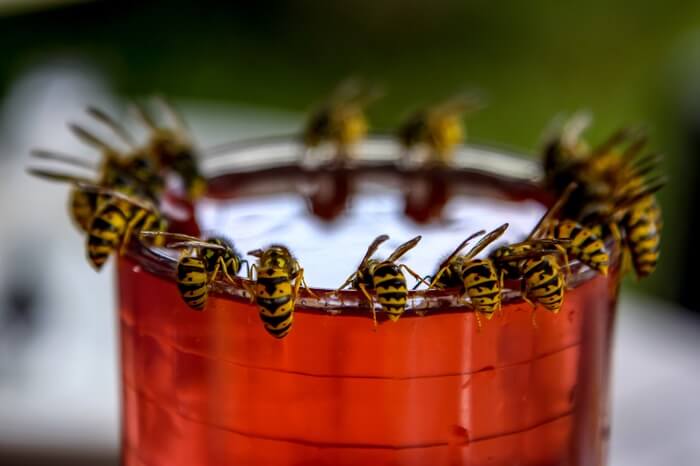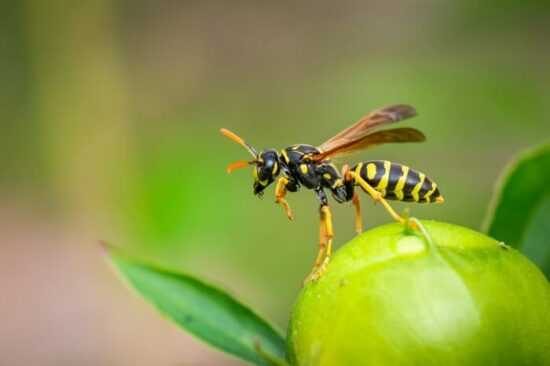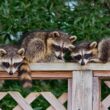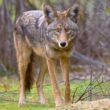There are a number of smells that wasps hate, and knowing them can be very helpful if you’re trying to repel these insects.
But detering such persistent bugs is easier said than done. In fact, this is one of the most common pest-related concerns we hear about from homeowners!
This guide will teach you how to keep wasps away by utilizing scents they hate. Trust us, you’ll be happy you gave it a read.
Table of contents
What Attracts Wasps?
Wasps are a widespread yet misunderstood insect. They’re often mistaken for bees and often pollinate plants in the same manner. However, wasps don’t produce honey.
Not only that, but wasps tend to be more aggressive and a lot more annoying!
These flying pests have a knack for creating invasive nests in areas close to human habitation. For example, they love to set up shop on porches, near pools, and around hidden cracks or crevices along exterior walls.
Like most insects, there are two main attractors (food and shelter).

You’re most likely to encounter wasps during the warmer months and close to the onset of winter. When the temperature rises, queen wasps emerge from hibernation and immediately start looking for food. They have to get stronger to lay eggs and establish a fast-growing colony.
There are about 30,000 wasp species out there, and preferred diets can vary from one type of wasp to the next. However, most will eat both protein-based snacks and sugary meals. Interestingly enough, their preference depends on the time of year.
In the summer, after jumping back into action after hibernation, proteins are the main draw. So, you may see queens flying close to the ground in search of insects, eggs, and grub. Or, you might see them hang around your summer barbecue!
In the fall, wasps prefer sugar foods. To find it, they’ll search for fallen fruit, sugary drinks in your trash, and anything else they can get their hands on.
No matter what time of year it is, don’t be surprised to see wasps around your trash can, compost pile, or kitchen window. Homes have a lot of potential food sources, which is why they tend to create nests nearby.
Your house also offers many forms of shelter, which is a must during the fall months. Males die off after impregnating females. Queens will continue to live, but they have to eat as much as possible before hibernating for the winter.
For this reason, it’s pretty common to see wasps exhibiting aggressive behaviors in their search for food and shelter as winter approaches. This is why using scents that wasps hate in order to keep them away is so important.
How To Repel Wasps With Scents They Hate
While your house and yard might be a goldmine of food for wasps, there are several ways to keep them away. Wasps have a strong sense of smell. It’s how they locate food and navigate the world around them.
One of the easiest ways to keep wasps out of your yard is to use their most vital asset against them! Here are some ways to use scents that wasps hate in order to repel or deter them.
1. Peppermint Oil
Peppermint oil produces a pleasant smell that most people don’t mind having around. However, many insects despise it! Wasps are no exception.
Wasps hate this scent and have a strong aversion to peppermint oil and the aroma it leaves behind. The exact reasoning for the strong reaction isn’t known. However, most experts believe that it has something to do with the menthol content.
Menthol is the chemical compound that’s responsible for the refreshing nature of peppermint. It may overwhelm the senses, making it difficult for wasps to be around. Whenever they come near peppermint oil, most wasps will immediately turn around and try to get as far away as possible.
Use that aversion to peppermint oil to your advantage! Add a few drops of the essential oil to a spray bottle filled with water. Even when diluted, the oil will produce a strong enough scent to keep wasps away.
Spray it onto any problem areas. You can use it on your porch, under decks, or even on most plants.
Another option is to soak a cotton ball or rag with oil. Because it’s not diluted, the aroma may be more potent and longer-lasting.
Quick Tip: Keep in mind that the oil will dissipate with time. It may linger for much longer as pure oil, but even that will evaporate with time. It would be best if you reapplied the spray or oil diffusion frequently in order to effectively deter wasps.
2. Plant Herbs In Your Garden
Want a more permanent way to keep wasps away than essential oil spray (that isn’t a traditional wasp spray)? Try taking up some gardening.
Believe it or not, several natural herbs repel wasps. Like peppermint oil, these plants give off a distinct smell that the flying pest hates! They’re not offensive to human senses, but it’s enough to keep most wasps out of the area.
Plant several deterring wasp repellent plants around your garden. You can spread them out all over the yard for maximum coverage. Alternatively, a multi-plant herb garden on your patio or porch will act as a central hub for everything wasps want to avoid. Either way, it pays to start gardening!
You have a lot of options here. Most aromatic herbs you see in culinary recipes will work. Some good examples include:
- Peppermint
- Spearmint
- Eucalyptus
- Citronella
- Lemongrass
- Thyme
- Wormwood
These plants are pretty easy to grow from seed. You can also find them in most garden centers if you want to get quick results. The best part of planting these wasp deterrents in your garden? All of these plants will serve you well in the kitchen, too!
3. Spray Some Vinegar
Here’s another all-natural smell that you can use to repel wasps.
Vinegar has a similar effect to peppermint oil and herbs. It gives off a super pungent scent that wasps hate. Unfortunately, the scent is also pretty offensive for humans!
Luckily, you can dilute the vinegar to ensure that it’s not overpowering for you and your family. It’ll still pack a big punch against wasps without making your property unbearable.
A good starting point is to combine equal parts of water and white vinegar. You can adjust things from there as you see fit. You can even add some peppermint oil to deliver a one-two punch!
Once you have your mixture ready, spray all those problem areas. Like before, you’ll need to reapply every few days for continued coverage. The good news is that white vinegar is pretty cheap and easy to source.
Quick Tip: Whatever you do, make sure that you’re using white vinegar and not apple cider vinegar. The fermentation on the latter product may attract wasps instead of repelling them!
4. Get Help From Plants That Deter Them
Earlier, we talked a little about herbs you can use in order to keep wasps away. While those cultivars are undoubtedly effective, you can also go the ornamental route.
Several ornamental plants produce aromas that are offensive to wasps. The most effective is marigold. Planting these red-colored flowers around your yard will add a pop of color while also keeping those pesky wasps out of the way!
Believe it or not, marigolds produce a smell that repels a wide range of insects. In addition to wasps, it can keep whiteflies, nematodes, and more away from your garden. They’re surprisingly helpful, so don’t be afraid to flex your green thumb and start a marigold garden!
Other potential plants you can use include chamomile flowers, geraniums, and wintergreens.
5. Try Clove & Lemongrass
Clove and lemongrass make an excellent mixture with a distinct aroma. Clove oil has an unmistakably woody scent. Pairing it with the acidic nature of lemongrass results in a one-of-a-kind scent that wasps hate. In fact, many say that this is their favorite method for repelling and deterring wasps.
Utilizing clove and lemongrass and clove is pretty straightforward. The essential oils are easy to source, but they can be a bit pricey depending on the quality.
Low-quality oils will do just fine for wasp deterrents. Add several drops of each oil into a spray bottle with water. Give it a good shake, and apply it to problematic areas.
The great thing about this combination is that it has an attractive smell many people love. As a result, this may be a better solution for indoor use than vinegar or peppermint oil.
As always, don’t forget to reapply the spray for continued results.
6. Scatter Some Cucumber Slices
Who would have thought that salad leftovers could be so effective at keeping wasps away?
Cucumbers produce a refreshing smell that’s not too overpowering. Some people get so used to the scent that they go nose blind to it. However, this is a scent that wasps hate!
The magical compound in cucumbers is cucurbitacins, which produce a bitter smell and taste for insects. Leaving cucumbers to sit in the open air will force the cucurbitacins to spread, ultimately irritating the wasp’s senses.
You don’t need to create a water solution to get results. All you have to do is chop the cucumber up into slices. Then, you can spread it in your backyard.
Spread the splices in all areas where wasps frequent. Even a single slice has enough smell to waft around and protect the surrounding area.
If you need to deter wasps in an indoor area, place the cucumber slices on an aluminum pan. The aluminum reacts to the vegetable and produces an even more distinct smell. As you can probably guess, this is a scent that wasps hate as well.
Quick Tip: Whether you use the cucumber indoors or out, it’s important to remember that the slices will decay over time. As they do, the vegetable could attract maggots, flies, and other unwanted pests. To avoid those issues, consider replacing the slices every few days.
7. Spread Bay Leaves
If you’re a food lover, you’re likely familiar with bay leaves. While they often look like leaves from the trees in your backyard, they come from the bay laurel tree.
Known for their intense aroma, bay leaves are a popular herb in cooking. You can usually find them in the spice section of your grocery store. If not there, look in the foreign food section!
To use the leaves, grind them up and spread them in your backyard. Grinding the leaves is paramount because doing so releases the oil within.
Bay leaves contain eugenol essential oil. It’s similar to the oil you’d find in cloves. The smell is intense and super irritating to wasps.
Scatter some crushed-up leaves in your yard. They’ll blend in with other yard debris, but the scent they create is unmistakable, repelling a surprising amount of nearby wasps!
Why It’s Important To Deter Wasps
Any of these scents that wasps hate can do a lot when it comes to keeping these insects away.
But do you really need to repel them at all?
Wasps indeed serve a few practical purposes. Many species are efficient pollinators that help plants bloom. These bugs reportedly gravitate to bright colors, making them a reliable pollinator for flower gardens and fruit trees.
These bugs are also fantastic exterminators of smaller insects. They feed on flies, larvae, and many other common backyard pests. Thanks to their aggressive nature, they’re gifted predators that do a lot to control insect populations.
Those are the good things that wasps do. Unfortunately, their negative characteristics often outweigh the positives.
First and foremost, wasps sting! Wasps are far more likely to sting you than bees. Most will stick to themselves and not pay you any attention.
But the moment someone accidentally disturbs the nest or threatens their well-being? That’s when wasps go on the attack.
To make matters worse, wasps are swarmers. You don’t want to be on the other end of an angry swarm.
The potential dangers of wasp stings can vary based on species and individual reactions. For some people, a single sting results in nothing more than mild swelling and some itchiness. However, those who are prone to allergic reactions might go into anaphylactic shock.
Quick Tip: The risks get even more remarkable when you’re dealing with a swarm. One or two stings aren’t too much of a problem, but 30 or 40 stings can do significant damage. Large nests are fully capable of killing children and full-grown adults.
The last thing you want is to have a massive nest on your property. It makes your yard dangerous and poses a significant safety risk.
Unfortunately, wasp nests grow pretty quickly. Most species produce multi-cell hives, much like bees do. However, they don’t make honey, so each cell houses an egg or growing larvae.
It doesn’t take long for wasp populations to get out of hand. Not only does that increase the odds of swarming, but it can also put a lot of stress on whatever the hive is built on.
You should never ignore a wasp infestation. A few solitary wasps aren’t going to cause much trouble. But it would be best if you took action the moment you start to see nests forming.
Be proactive and do your part to keep wasps out of your property by repelling them with scents they hate. You and your family will be much safer without them!
Other Methods For Keeping Wasps Away
Scents that wasps hate can be very effective when it comes to repelling these insects. However, the level of success you experience can vary based on the method you choose and how much of the scent you utilize.
If you want long-term protection and more reliability, it’s a good idea to pair scent deterrents with other preventative measures.
Start by eliminating as many potential food sources on your property as possible. You can do that by keeping your yard clean. Fallen fruits, dying weeds, and tree debris can decay to create an attractive scent for these flying pests.
Not only that, but overgrown plants and piles of brush make secure hiding spots for these bugs to hibernate or nest. Pick up messes and do your best to keep your yard tidy. It’ll make a world of difference.
To stop your trash from drawing wasps in, use a sealed bin. Invest in an airtight can with no openings for wasps to fly through. The same principles apply to compost bins and other food sources.
Once you secure the trash and clean up any food, look at your house. Wasps like to take advantage of tiny cracks and crevices. Queens use those areas for hibernation in the winter and nesting during the summer.
Take a good look at exterior walls and seal up any potential hiding spaces. Pay close attention to the siding. Even tiny gaps can provide access to the wall. If wasps are extra vigilant, they can even make their way into the framing to use insulation for protection!
Use caulking, weatherstripping, and other sealing methods to close all entry points. If your siding is pretty old, you may want to consider investing in a complete replacement to protect your home.
Finally, steer clear of brightly colored yard decorations. This might seem a little strange, but wasps will gravitate towards colorful landscaping items. Remember: They like to pollinate flowers.
Wasps can’t see red, but they will identify bright blues, yellows, and greens. Even white will bring them in.
Avoid planting super bright flowers or using neon-colored yard props. If you can’t go without colorful items, try putting them in areas where wasps won’t be an issue. Avoid the porch, pool, and other spots your family enjoys.
Along with some strong-smelling repellents, these techniques should play a big part in keeping wasps away.
Closing Thoughts
Now that you know how to keep wasps away by using scents they hate, it’s time for you to start placing these deterrents on your property. Remember, repelling wasps requires persistence and consistency!
If you have questions about anything you read above, we’re more than happy to help.


